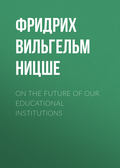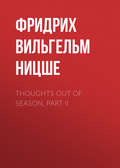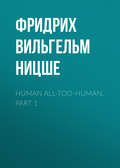
Фридрих Вильгельм Ницше
On the Future of our Educational Institutions – Homer and Classical Philology
"In regard to the language, what is surely least noticeable is any trace of the influence of classical examples: that is why, on the strength of this consideration alone, the so-called 'classical education' which is supposed to be provided by our public school, strikes me as something exceedingly doubtful and confused. For how could anybody, after having cast one glance at those examples, fail to see the great earnestness with which the Greek and the Roman regarded and treated his language, from his youth onwards – how is it possible to mistake one's example on a point like this one? – provided, of course, that the classical Hellenic and Roman world really did hover before the educational plan of our public schools as the highest and most instructive of all morals – a fact I feel very much inclined to doubt. The claim put forward by public schools concerning the 'classical education' they provide seems to be more an awkward evasion than anything else; it is used whenever there is any question raised as to the competency of the public schools to impart culture and to educate. Classical education, indeed! It sounds so dignified! It confounds the aggressor and staves off the assault – for who could see to the bottom of this bewildering formula all at once? And this has long been the customary strategy of the public school: from whichever side the war-cry may come, it writes upon its shield – not overloaded with honours – one of those confusing catchwords, such as: 'classical education,' 'formal education,' 'scientific education': – three glorious things which are, however, unhappily at loggerheads, not only with themselves but among themselves, and are such that, if they were compulsorily brought together, would perforce bring forth a culture-monster. For a 'classical education' is something so unheard of, difficult and rare, and exacts such complicated talent, that only ingenuousness or impudence could put it forward as an attainable goal in our public schools. The words: 'formal education' belong to that crude kind of unphilosophical phraseology which one should do one's utmost to get rid of; for there is no such thing as 'the opposite of formal education.' And he who regards 'scientific education' as the object of a public school thereby sacrifices 'classical education' and the so-called 'formal education,' at one stroke, as the scientific man and the cultured man belong to two different spheres which, though coming together at times in the same individual, are never reconciled.
"If we compare all three of these would-be aims of the public school with the actual facts to be observed in the present method of teaching German, we see immediately what they really amount to in practice, – that is to say, only to subterfuges for use in the fight and struggle for existence and, often enough, mere means wherewith to bewilder an opponent. For we are unable to detect any single feature in this teaching of German which in any way recalls the example of classical antiquity and its glorious methods of training in languages. 'Formal education,' however, which is supposed to be achieved by this method of teaching German, has been shown to be wholly at the pleasure of the 'free personality,' which is as good as saying that it is barbarism and anarchy. And as for the preparation in science, which is one of the consequences of this teaching, our Germanists will have to determine, in all justice, how little these learned beginnings in public schools have contributed to the splendour of their sciences, and how much the personality of individual university professors has done so. – Put briefly: the public school has hitherto neglected its most important and most urgent duty towards the very beginning of all real culture, which is the mother-tongue; but in so doing it has lacked the natural, fertile soil for all further efforts at culture. For only by means of stern, artistic, and careful discipline and habit, in a language, can the correct feeling for the greatness of our classical writers be strengthened. Up to the present their recognition by the public schools has been owing almost solely to the doubtful æsthetic hobbies of a few teachers or to the massive effects of certain of their tragedies and novels. But everybody should, himself, be aware of the difficulties of the language: he should have learnt them from experience: after long seeking and struggling he must reach the path our great poets trod in order to be able to realise how lightly and beautifully they trod it, and how stiffly and swaggeringly the others follow at their heels.
"Only by means of such discipline can the young man acquire that physical loathing for the beloved and much-admired 'elegance' of style of our newspaper manufacturers and novelists, and for the 'ornate style' of our literary men; by it alone is he irrevocably elevated at a stroke above a whole host of absurd questions and scruples, such, for instance, as whether Auerbach and Gutzkow are really poets, for his disgust at both will be so great that he will be unable to read them any longer, and thus the problem will be solved for him. Let no one imagine that it is an easy matter to develop this feeling to the extent necessary in order to have this physical loathing; but let no one hope to reach sound æsthetic judgments along any other road than the thorny one of language, and by this I do not mean philological research, but self-discipline in one's mother-tongue.
"Everybody who is in earnest in this matter will have the same sort of experience as the recruit in the army who is compelled to learn walking after having walked almost all his life as a dilettante or empiricist. It is a hard time: one almost fears that the tendons are going to snap and one ceases to hope that the artificial and consciously acquired movements and positions of the feet will ever be carried out with ease and comfort. It is painful to see how awkwardly and heavily one foot is set before the other, and one dreads that one may not only be unable to learn the new way of walking, but that one will forget how to walk at all. Then it suddenly become noticeable that a new habit and a second nature have been born of the practised movements, and that the assurance and strength of the old manner of walking returns with a little more grace: at this point one begins to realise how difficult walking is, and one feels in a position to laugh at the untrained empiricist or the elegant dilettante. Our 'elegant' writers, as their style shows, have never learnt 'walking' in this sense, and in our public schools, as our other writers show, no one learns walking either. Culture begins, however, with the correct movement of the language: and once it has properly begun, it begets that physical sensation in the presence of 'elegant' writers which is known by the name of 'loathing.'
"We recognise the fatal consequences of our present public schools, in that they are unable to inculcate severe and genuine culture, which should consist above all in obedience and habituation; and that, at their best, they much more often achieve a result by stimulating and kindling scientific tendencies, is shown by the hand which is so frequently seen uniting scholarship and barbarous taste, science and journalism. In a very large majority of cases to-day we can observe how sadly our scholars fall short of the standard of culture which the efforts of Goethe, Schiller, Lessing, and Winckelmann established; and this falling short shows itself precisely in the egregious errors which the men we speak of are exposed to, equally among literary historians – whether Gervinus or Julian Schmidt – as in any other company; everywhere, indeed, where men and women converse. It shows itself most frequently and painfully, however, in pedagogic spheres, in the literature of public schools. It can be proved that the only value that these men have in a real educational establishment has not been mentioned, much less generally recognised for half a century: their value as preparatory leaders and mystogogues of classical culture, guided by whose hands alone can the correct road leading to antiquity be found.
"Every so-called classical education can have but one natural starting-point – an artistic, earnest, and exact familiarity with the use of the mother-tongue: this, together with the secret of form, however, one can seldom attain to of one's own accord, almost everybody requires those great leaders and tutors and must place himself in their hands. There is, however, no such thing as a classical education that could grow without this inferred love of form. Here, where the power of discerning form and barbarity gradually awakens, there appear the pinions which bear one to the only real home of culture – ancient Greece. If with the solitary help of those pinions we sought to reach those far-distant and diamond-studded walls encircling the stronghold of Hellenism, we should certainly not get very far; once more, therefore, we need the same leaders and tutors, our German classical writers, that we may be borne up, too, by the wing-strokes of their past endeavours – to the land of yearning, to Greece.
"Not a suspicion of this possible relationship between our classics and classical education seems to have pierced the antique walls of public schools. Philologists seem much more eagerly engaged in introducing Homer and Sophocles to the young souls of their pupils, in their own style, calling the result simply by the unchallenged euphemism: 'classical education.' Let every one's own experience tell him what he had of Homer and Sophocles at the hands of such eager teachers. It is in this department that the greatest number of deepest deceptions occur, and whence misunderstandings are inadvertently spread. In German public schools I have never yet found a trace of what might really be called 'classical education,' and there is nothing surprising in this when one thinks of the way in which these institutions have emancipated themselves from German classical writers and the discipline of the German language. Nobody reaches antiquity by means of a leap into the dark, and yet the whole method of treating ancient writers in schools, the plain commentating and paraphrasing of our philological teachers, amounts to nothing more than a leap into the dark.
"The feeling for classical Hellenism is, as a matter of fact, such an exceptional outcome of the most energetic fight for culture and artistic talent that the public school could only have professed to awaken this feeling owing to a very crude misunderstanding. In what age? In an age which is led about blindly by the most sensational desires of the day, and which is not aware of the fact that, once that feeling for Hellenism is roused, it immediately becomes aggressive and must express itself by indulging in an incessant war with the so-called culture of the present. For the public school boy of to-day, the Hellenes as Hellenes are dead: yes, he gets some enjoyment out of Homer, but a novel by Spielhagen interests him much more: yes, he swallows Greek tragedy and comedy with a certain relish, but a thoroughly modern drama, like Freitag's 'Journalists,' moves him in quite another fashion. In regard to all ancient authors he is rather inclined to speak after the manner of the æsthete, Hermann Grimm, who, on one occasion, at the end of a tortuous essay on the Venus of Milo, asks himself: 'What does this goddess's form mean to me? Of what use are the thoughts she suggests to me? Orestes and OEdipus, Iphigenia and Antigone, what have they in common with my heart?' – No, my dear public school boy, the Venus of Milo does not concern you in any way, and concerns your teacher just as little – and that is the misfortune, that is the secret of the modern public school. Who will conduct you to the land of culture, if your leaders are blind and assume the position of seers notwithstanding? Which of you will ever attain to a true feeling for the sacred seriousness of art, if you are systematically spoiled, and taught to stutter independently instead of being taught to speak; to æstheticise on your own account, when you ought to be taught to approach works of art almost piously; to philosophise without assistance, while you ought to be compelled to listen to great thinkers. All this with the result that you remain eternally at a distance from antiquity and become the servants of the day.
"At all events, the most wholesome feature of our modern institutions is to be found in the earnestness with which the Latin and Greek languages are studied over a long course of years. In this way boys learn to respect a grammar, lexicons, and a language that conforms to fixed rules; in this department of public school work there is an exact knowledge of what constitutes a fault, and no one is troubled with any thought of justifying himself every minute by appealing (as in the case of modern German) to various grammatical and orthographical vagaries and vicious forms. If only this respect for language did not hang in the air so, like a theoretical burden which one is pleased to throw off the moment one turns to one's mother-tongue! More often than not, the classical master makes pretty short work of the mother-tongue; from the outset he treats it as a department of knowledge in which one is allowed that indolent ease with which the German treats everything that belongs to his native soil. The splendid practice afforded by translating from one language into another, which so improves and fertilises one's artistic feeling for one's own tongue, is, in the case of German, never conducted with that fitting categorical strictness and dignity which would be above all necessary in dealing with an undisciplined language. Of late, exercises of this kind have tended to decrease ever more and more: people are satisfied to know the foreign classical tongues, they would scorn being able to apply them.
"Here one gets another glimpse of the scholarly tendency of public schools: a phenomenon which throws much light upon the object which once animated them, – that is to say, the serious desire to cultivate the pupil. This belonged to the time of our great poets, those few really cultured Germans, – the time when the magnificent Friedrich August Wolf directed the new stream of classical thought, introduced from Greece and Rome by those men, into the heart of the public schools. Thanks to his bold start, a new order of public schools was established, which thenceforward was not to be merely a nursery for science, but, above all, the actual consecrated home of all higher and nobler culture.
"Of the many necessary measures which this change called into being, some of the most important have been transferred with lasting success to the modern regulations of public schools: the most important of all, however, did not succeed – the one demanding that the teacher, also, should be consecrated to the new spirit, so that the aim of the public school has meanwhile considerably departed from the original plan laid down by Wolf, which was the cultivation of the pupil. The old estimate of scholarship and scholarly culture, as an absolute, which Wolf overcame, seems after a slow and spiritless struggle rather to have taken the place of the culture-principle of more recent introduction, and now claims its former exclusive rights, though not with the same frankness, but disguised and with features veiled. And the reason why it was impossible to make public schools fall in with the magnificent plan of classical culture lay in the un-German, almost foreign or cosmopolitan nature of these efforts in the cause of education: in the belief that it was possible to remove the native soil from under a man's feet and that he should still remain standing; in the illusion that people can spring direct, without bridges, into the strange Hellenic world, by abjuring German and the German mind in general.
"Of course one must know how to trace this Germanic spirit to its lair beneath its many modern dressings, or even beneath heaps of ruins; one must love it so that one is not ashamed of it in its stunted form, and one must above all be on one's guard against confounding it with what now disports itself proudly as 'Up-to-date German culture.' The German spirit is very far from being on friendly times with this up-to-date culture: and precisely in those spheres where the latter complains of a lack of culture the real German spirit has survived, though perhaps not always with a graceful, but more often an ungraceful, exterior. On the other hand, that which now grandiloquently assumes the title of 'German culture' is a sort of cosmopolitan aggregate, which bears the same relation to the German spirit as Journalism does to Schiller or Meyerbeer to Beethoven: here the strongest influence at work is the fundamentally and thoroughly un-German civilisation of France, which is aped neither with talent nor with taste, and the imitation of which gives the society, the press, the art, and the literary style of Germany their pharisaical character. Naturally the copy nowhere produces the really artistic effect which the original, grown out of the heart of Roman civilisation, is able to produce almost to this day in France. Let any one who wishes to see the full force of this contrast compare our most noted novelists with the less noted ones of France or Italy: he will recognise in both the same doubtful tendencies and aims, as also the same still more doubtful means, but in France he will find them coupled with artistic earnestness, at least with grammatical purity, and often with beauty, while in their every feature he will recognise the echo of a corresponding social culture. In Germany, on the other hand, they will strike him as unoriginal, flabby, filled with dressing-gown thoughts and expressions, unpleasantly spread out, and therewithal possessing no background of social form. At the most, owing to their scholarly mannerisms and display of knowledge, he will be reminded of the fact that in Latin countries it is the artistically-trained man, and that in Germany it is the abortive scholar, who becomes a journalist. With this would-be German and thoroughly unoriginal culture, the German can nowhere reckon upon victory: the Frenchman and the Italian will always get the better of him in this respect, while, in regard to the clever imitation of a foreign culture, the Russian, above all, will always be his superior.
"We are therefore all the more anxious to hold fast to that German spirit which revealed itself in the German Reformation, and in German music, and which has shown its enduring and genuine strength in the enormous courage and severity of German philosophy and in the loyalty of the German soldier, which has been tested quite recently. From it we expect a victory over that 'up-to-date' pseudo-culture which is now the fashion. What we should hope for the future is that schools may draw the real school of culture into this struggle, and kindle the flame of enthusiasm in the younger generation, more particularly in public schools, for that which is truly German; and in this way so-called classical education will resume its natural place and recover its one possible starting-point.
"A thorough reformation and purification of the public school can only be the outcome of a profound and powerful reformation and purification of the German spirit. It is a very complex and difficult task to find the border-line which joins the heart of the Germanic spirit with the genius of Greece. Not, however, before the noblest needs of genuine German genius snatch at the hand of this genius of Greece as at a firm post in the torrent of barbarity, not before a devouring yearning for this genius of Greece takes possession of German genius, and not before that view of the Greek home, on which Schiller and Goethe, after enormous exertions, were able to feast their eyes, has become the Mecca of the best and most gifted men, will the aim of classical education in public schools acquire any definition; and they at least will not be to blame who teach ever so little science and learning in public schools, in order to keep a definite and at the same time ideal aim in their eyes, and to rescue their pupils from that glistening phantom which now allows itself to be called 'culture' and 'education.' This is the sad plight of the public school of to-day: the narrowest views remain in a certain measure right, because no one seems able to reach or, at least, to indicate the spot where all these views culminate in error."
"No one?" the philosopher's pupil inquired with a slight quaver in his voice; and both men were silent.







